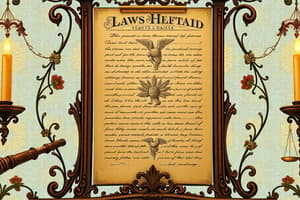Podcast
Questions and Answers
Under what circumstances does an official document, despite not meeting all legal conditions, still hold binding force?
Under what circumstances does an official document, despite not meeting all legal conditions, still hold binding force?
An official document that does not meet all legal conditions can still hold binding force if the concerned parties have affixed their signatures, seals, or fingerprints to it.
How does the legal status of an official copy of a document differ depending on the existence of the original document?
How does the legal status of an official copy of a document differ depending on the existence of the original document?
If the original document exists, the official copy is considered evidence only if it is proven to be a true copy. However, if the original is lost, the official copy holds the same binding force as the original if its external appearance confirms its authenticity.
What conditions must be met for a correspondence to be considered an informal document in evidence?
What conditions must be met for a correspondence to be considered an informal document in evidence?
Correspondence must be signed or proven to be ascribed to its sender to be considered an informal document.
Explain the legal significance of a signature on an informal document.
Explain the legal significance of a signature on an informal document.
In what scenario does an informal document, despite being invoked against someone, lose its legal power?
In what scenario does an informal document, despite being invoked against someone, lose its legal power?
Explain the concept of "binding force" as it pertains to official documents.
Explain the concept of "binding force" as it pertains to official documents.
What are the limitations placed on the evidentiary value of traders' ledgers?
What are the limitations placed on the evidentiary value of traders' ledgers?
Explain the difference between the legal force of an official copy of a document when the original exists and when it does not.
Explain the difference between the legal force of an official copy of a document when the original exists and when it does not.
Under what conditions can the court order a litigant to submit a document they claim to possess?
Under what conditions can the court order a litigant to submit a document they claim to possess?
What happens if a litigant refuses to submit a requested document despite being granted a grace period?
What happens if a litigant refuses to submit a requested document despite being granted a grace period?
Describe the process involved when a litigant denies the existence of a requested document.
Describe the process involved when a litigant denies the existence of a requested document.
What are the two situations in which the court can directly request a document or its certified copy from a public authority?
What are the two situations in which the court can directly request a document or its certified copy from a public authority?
What are the essential elements that a request for a document must satisfy to be accepted by the court?
What are the essential elements that a request for a document must satisfy to be accepted by the court?
Explain the purpose of the grace period concerning document submission.
Explain the purpose of the grace period concerning document submission.
In the context of document requests, what does the provided text imply about the court's role in ensuring fairness and accuracy?
In the context of document requests, what does the provided text imply about the court's role in ensuring fairness and accuracy?
What are the potential consequences of refusing to submit a document to the court after being requested to do so?
What are the potential consequences of refusing to submit a document to the court after being requested to do so?
Explain the circumstances under which a litigant can compel their opponent to submit a paper or electronic document relevant to the case, and provide an example of such a document.
Explain the circumstances under which a litigant can compel their opponent to submit a paper or electronic document relevant to the case, and provide an example of such a document.
Describe the conditions under which private papers, even if recorded electronically, can constitute evidence against the issuer.
Describe the conditions under which private papers, even if recorded electronically, can constitute evidence against the issuer.
Explain the concept of a 'suppletory oath' in relation to obligatory ledgers and how it can be applied in a legal dispute.
Explain the concept of a 'suppletory oath' in relation to obligatory ledgers and how it can be applied in a legal dispute.
Under what conditions can a creditor's handwritten annotation on a debt deed, without a signature, be used as evidence against them?
Under what conditions can a creditor's handwritten annotation on a debt deed, without a signature, be used as evidence against them?
Explain the evidential weight of orderly obligatory ledgers in a legal dispute, and identify any limitations to their use.
Explain the evidential weight of orderly obligatory ledgers in a legal dispute, and identify any limitations to their use.
How can the supplies made by traders be used as evidence in a legal proceeding? What limitations exist on their use?
How can the supplies made by traders be used as evidence in a legal proceeding? What limitations exist on their use?
What is the significance of "counter-evidence" in the context of obligatory ledgers? Provide an example.
What is the significance of "counter-evidence" in the context of obligatory ledgers? Provide an example.
In what ways can the entries in obligatory ledgers be used as evidence both for and against the trader who holds them?
In what ways can the entries in obligatory ledgers be used as evidence both for and against the trader who holds them?
Flashcards
Obligatory ledgers
Obligatory ledgers
Records of transactions that serve as legal evidence in disputes.
Electronic vs. paper ledgers
Electronic vs. paper ledgers
Both types can serve as evidence against traders in disputes.
Counter-evidence
Counter-evidence
Evidence presented to counteract or challenge existing evidence.
Suppletory oath
Suppletory oath
Signup and view all the flashcards
Creditor’s handwritten notes
Creditor’s handwritten notes
Signup and view all the flashcards
Joint documents
Joint documents
Signup and view all the flashcards
Private papers
Private papers
Signup and view all the flashcards
Litigant's request for documents
Litigant's request for documents
Signup and view all the flashcards
Official Document
Official Document
Signup and view all the flashcards
Informal Document
Informal Document
Signup and view all the flashcards
Enforceability of Official Document
Enforceability of Official Document
Signup and view all the flashcards
True Copy
True Copy
Signup and view all the flashcards
Proof of Document Authenticity
Proof of Document Authenticity
Signup and view all the flashcards
Binding Force of Signed Correspondence
Binding Force of Signed Correspondence
Signup and view all the flashcards
Traders' Ledgers Evidence
Traders' Ledgers Evidence
Signup and view all the flashcards
Forgery
Forgery
Signup and view all the flashcards
Document Request Conditions
Document Request Conditions
Signup and view all the flashcards
Court Order for Submission
Court Order for Submission
Signup and view all the flashcards
Grace Period
Grace Period
Signup and view all the flashcards
Authentic True Copy
Authentic True Copy
Signup and view all the flashcards
Denial of Document Existence
Denial of Document Existence
Signup and view all the flashcards
Oath Requirement
Oath Requirement
Signup and view all the flashcards
Bringing in Third Parties
Bringing in Third Parties
Signup and view all the flashcards
Request from Public Authority
Request from Public Authority
Signup and view all the flashcards
Study Notes
Written Evidence - Part 1
- Official Document: A document where a public servant records actions or received items from others, adhering to legal limits of authority and jurisdiction (e.g., Notary Public).
- Binding Force of Informal Documents: If a document doesn't meet official criteria, it holds the same weight as an informal document. This includes signatures (initials alone are insufficient), seals, or fingerprints.
- Enforceability of Official Documents: A formally executed document is enforceable regarding matters recorded unless proven a forgery.
- Official Copies/Original Documents: If the original exists, its official copy is evidence. Unless challenged by parties, the copy is considered true. If no original is found, the copy has the same binding force as the original, if its appearance is consistent. Other copies are for illustrative purposes only.
- Informal Documents: An informal document originates from the signer unless explicitly denied by the signer or their successor. Handwriting, signature, seal, or fingerprint is questioned and proof required.
- Correspondence: Signed correspondence is considered an informal document, unless proven not sent or the sender denies sending it.
- Traders' Ledgers: Traders' electronic or paper ledgers are not evidence against non-traders, unless they relate to business matters. In business disputes, these ledgers can be evidence against the trader. If the opponent quotes ledger entries, the ledgers can be used as evidence in support of the other trader.
- Private Papers: Private papers, including electronic records, are not evidence unless specific conditions are met. These conditions include: (1) explicit statements of debt collection, (2) intent to create a deed granting rights. If mentioned but not signed, the opposite can be proven.
- Creditor's Annotation of Debt Deed: A creditor's handwritten annotation of debt discharge, without the necessary signature, forms evidence against the debtor, until proven otherwise.
- Litigant Requests to the Court: A litigant can request the court to order the opponent to provide documents. The request must contain detailed information about the document, its content and how it relates to the case. Also supporting evidence and circumstances of its possession. The reason for requiring its submission must be clear.
- Compliance with Document Requests: If a litigant admits or does not dispute having possession of a requested document, the court forces that document to be submitted. If refusing after a grace period, the document submitted becomes recognized as the authentic copy. If the appropriate copy is not produced, a statement regarding its form and contents, provided by the person making the request, is accepted.
- Denial of Document Existence: If a litigant denies a document's existence, the court may request the opponent to prove the document's non-existence, their lack of knowledge, and to show not hiding or neglecting to find the document. Refusal to take this oath, or if the oath is retracted, the submitted document is considered the true copy.
- Third-Party Documents: Courts can summon and request documents held by third parties relevant to the case.
Studying That Suits You
Use AI to generate personalized quizzes and flashcards to suit your learning preferences.




